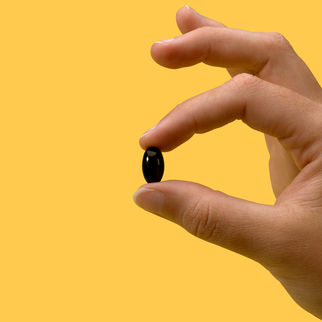Omega-3 fatty acids are vital nutrients known for their wide range of health benefits. From supporting cardiovascular health and cognitive function to supporting eye and skin health, omega-3s are crucial. These fats are critical players in maintaining overall health and wellness, but their role extends even further when it comes to bodybuilding and physical workouts.
For athletes and fitness enthusiasts, omega-3's benefits are particularly noteworthy. These fatty acids influence several physiological functions that directly contribute to physical performance, recovery, and muscle health.
Let’s dive into omega-3's role in bodybuilding and working out, and why this nutrient should be an integral part of your fitness regimen.
What Is Omega-3?
Omega-3 fatty acids are a vital part of our diet, playing key roles in numerous bodily functions, especially supporting our joints, brains, eyes, and overall wellness. There are three primary types of omega-3s: EPA (eicosapentaenoic acid), DHA (docosahexaenoic acid), and ALA (alpha-linolenic acid), which is an omega-3 precursor.
EPA and DHA are long-chain omega-3s, crucial for the proper functioning of your heart, brain, and eyes. Unlike ALA, they are "pre-formed," meaning your body can use them directly without needing to convert them. This is the major distinction between true omega-3 fats and ALA.
On the other hand, ALA is a short-chain omega-3 found in plant foods like flax, chia, walnuts, and soy. Your body can convert ALA to EPA and DHA, but only in very small amounts. Hence, it's conditionally essential, as most Americans get plenty of ALA from food sources and plenty of omega-6, but often lack adequate DHA and EPA.
Food sources rich in DHA and EPA are predominantly fish and seafood. However, for those seeking a sustainable, plant-based source, iwi life offers an exceptional solution. Our omega-3 products are brought to you thanks to a special strain of algae, Nannochloropsis, that produces true EPA and DHA — so your body doesn’t need to make conversions.
Algae is our "power plant," effectively bypassing the middle fish and providing true, clean omega-3 directly to you. This approach aligns with our brand values, ensuring better nutrition that’s better for you and the planet.
How Do Omega-3s Impact Muscle Health?
Omega-3 fatty acids aren't just about heart and brain health; they can also play a significant role in muscle health. Specifically, EPA and DHA have been shown to help support muscle protein synthesis, which is the process through which the body rebuilds and strengthens muscle tissue.
Research suggests that the soothing properties of omega-3s could help ease muscle tension and support recovery after workouts. Additionally, omega-3s are thought to enhance muscle growth by improving blood flow during exercise, transporting nutrients to muscles more efficiently.
Omega-3s also have an essential role in muscle health, particularly in older adults. Studies have indicated that omega-3 supplementation can help support muscle function and strength in older adults, working to support long-term mobility.
iwi life's omega-3 supplement, with its high DHA and EPA content derived from sustainable algae sources, can be a part of your approach to maintaining muscle health. Embracing a supplement like ours not only supports your individual wellness journey but also aids in safeguarding the planet.
As part of iwi life, you're included — vegans, vegetarians, keto dieters, and all. It's about making wellness work for you, no matter what your lifestyle looks like.
How Does Omega-3 Help With Recovery and Tension?
Thanks to their soothing properties, omega-3 fatty acids can be a significant factor in post-workout recovery. After intense physical activity, muscle tissue breaks down and needs to repair and grow stronger — this tissue breakdown can lead to feelings of tension in the body.
Enter omega-3, particularly the EPA and DHA types, which are known for their soothing, supportive effects. These essential fats support the body’s natural healing processes, which, in turn, can help ease muscle tension and support overall recovery time post-workout.
Research also indicates that omega-3 can help to support muscle mass during periods of disuse, such as during off-seasons. This is particularly important for athletes who need to maintain their muscle strength even during off periods.
How Does Omega-3 Support Performance and Energy?
In the context of athletic performance and endurance, omega-3 again plays a crucial role. These fatty acids help support blood flow, allowing proper levels of oxygen and nutrients to reach the muscles during exercise. This nutrient and oxygen supply can support overall athletic performance and endurance.
Omega-3 fatty acids also impact cellular metabolism. They are a component of cell membranes and play a role in cell receptor function, gene expression, and cellular function. These functions directly impact energy production, making omega-3 essential for maintaining optimal energy levels during workouts.
Research has suggested that omega-3 supplementation can help support proper aerobic metabolism, enabling athletes to push harder and longer during their workouts. Additionally, it's believed that omega-3s can help reduce fatigue, further contributing to improved performance and energy levels.
By easing tension, supporting muscle recovery, and supporting energy production, omega-3 is a natural and effective way to support your athletic capabilities while contributing to your overall health.
Just remember that while omega-3 can significantly support your athletic endeavors, it should be part of a balanced diet and lifestyle that incorporates regular exercise, adequate sleep, and proper hydration.
How To Include Omega-3 in Your Fitness Routine
Adding omega-3 to your fitness diet doesn't have to be complex. It can start with simple dietary changes. Foods rich in omega-3 include fatty fish like salmon, mackerel, and sardines, which contain long-chain DHA and EPA. Including these in your meals regularly can help boost your omega-3 intake.
However, due to the high amount of omega-3 needed to experience its full benefits, as well as the lack of plant-based sources of true omega-3, supplementation often becomes necessary. As we’ve mentioned previously, this is where iwi life's omega-3 supplement comes in.
Our supplement offers a plant-based, sustainable choice that is derived from algae, the original source of omega-3 in nature. Not only is it an excellent option for vegetarians and vegans, but it also boasts superior absorption, ensuring your body gets the maximum benefit from each dose.
The Bottom Line
Omega-3 plays a significant role in bodybuilding, athletic performance, and working out, contributing to improved muscle health, enhanced recovery, and increased energy and endurance. By understanding its importance and how it works, you can make more informed decisions about your nutrition and fitness regimen.
Consider your omega-3 intake as an integral part of your fitness journey. As you strive to achieve your goals,maintaining optimal health is key, and omega-3 is a major player.
Explore iwi life's omega-3 supplement as part of your strategy. Its plant-based, sustainable, and highly bioavailable nature makes it a superior choice for those looking to enhance their fitness regimen while also contributing to overall health. Embrace the power of omega-3, and let it fuel your journey towards peak physical performance.
Sources:
Omega-3 Fatty Acids & the Important Role They Play | Cleveland Clinic
Eicosapentaenoic Acid (EPA) and Docosahexaenoic Acid (DHA) | NCBI Bookshelf


















